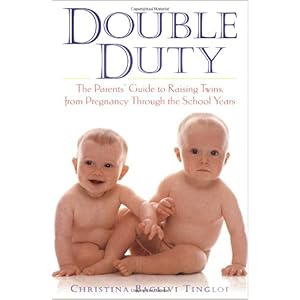At first this book intrigued me. Most books that we've been looking at focus on pregnancy and the first year. While this makes sense for us now, it seemed like it would be neat to "peek ahead" with a book that had a little less about pregnancy, a little more about the first year, and a couple of chapters about life beyond that.
Unfortunately, my interest did not last long. Flipping through the book, I found the advice,
Try not to refer to your children as "the twins".Really? Most parents I know talk about "the kids", "the boys", "the girls", etc. More to the point, why not? After some discussion, Christina (my wife, not Ms. Baglivi Tinglof) and I decided that it was reasonable to refer to them as "the twins" in the third person -- as in, "We just dropped off the twins with their grandparents, and we're headed for Vegas." It did, however, seem inappropriate to address them as such. ("Twins, get in here!") If we're going to be accused of causing lasting psychological damage to our kids, I'd at least like to know why.
Reading the introduction, I see how the book was constructed. The author interviewed a bunch of parents of twins, and a pediatrician, and compiled the advice she got. The result, unfortunately, is a mix of good and bad advice, with little way to distinguish between the two.
In the first chapter, she tells us,
African races have the highest incidence of twinning (about 20 percent more likely than Caucasian women), followed by Europeans, then Mexicans. Asians have the lowest incidence.Reading this paragraph aloud provoked a lecture on Mexican racial identity from the Mexican-American in bed next to me. (Summary: It makes about as much sense to call Mexicans a race as it does to refer to the "United States race".)
The author provides numerous Top Five lists. The "Top Five Comebacks to Annoying Questions and Comments" caught our eye, since we're planning to institute a similar feature here at twinpanic.com. (Preview: "Are they twins?" "No, they're triplets...oh, crap, one's missing again.") We were brought up short by #4:
Question: "Twins? How do you tell them apart?"OK, at least we laughed at that one, but it seemed a little inappropriate.
Answer: "We had only one twin circumcised."
In short, I can't recommend this book; there are too many other, more carefully written books about twins out there. Even those which are also collections of advice are more explicit about the source of and reasoning behind that advice. This one's going back to the library soon.
Twinometer: 3/10.

